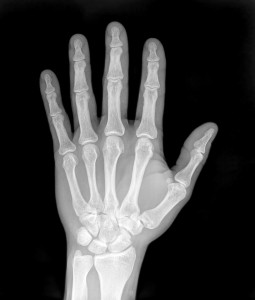Fractures of the Hand/Wrist
On this page:
A fracture is described as a break in a bone. Fractures can present in many different ways; it may be a simple break across a bone or the bone could fracture into in many fragments. Fractures can occur as part of a more complex injury involving a joint dislocation, or damage to soft tissue (such as tendon lacerations). It is essential to have an x-ray to determine whether you have a fracture, so we recommend that you attend your local A&E department for a review and then be referred onto the Hand Unit, based at St Georges Hospital, if needed.

Hand therapy treatment may involve splinting to protect the fracture from knocks and bumps and to allow for healing. You may also be give some exercises to ensure that the joints of your hand do not get stiff and to help you regain movement following your injury. Your therapist will adjust your treatment and exercises based on the fracture you have sustained.
For further information regarding hand fractures, see below link to the British Society of Surgery for the Hand:
https://www.bssh.ac.uk/patients/conditions/31/general_information_on_hand_fractures
*BEFORE COMMENCING ANY OF THE FOLLOWING ADVICE OR EXERCISES, PLEASE DISCUSS WITH YOUR HAND THERAPIST TO CONFIRM IF IT IS APPROPRIATE FOR YOUR CONDITION*
For hand fractures patient handout:


